TEAM Workshop No. 20 |
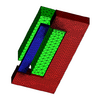 |
Three-dimensional, static electromagnetic calculation. As an example, the
TEAM Workshop No. 20
is calculated. This model is also available for download in the examples distribution.
|
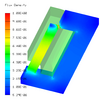 |
The flux density distribution of TEAM Workshop No. 20 |
|
Induction Machine |
 |
Structural deformation of an induction machine caused by the electromagnetic forces on the stator teeth (fourth mode) |
 |
Flux density distribution on the stator with a skewed rotor.
Download movie here (6.6MB) |
 |
Animated structural deformation. Download movie here (3.5MB) |
|
2D Transient Calculation of an Induction Machine |
 |
Geometry plot of an induction machine with squirrel cage. |
 |
The finite element mesh. |
 |
The magnetic vector potential. As it can be seen, it is a machine with two pole pairs. |
 |
Isolines of the magnetic vector potential. |
 |
Flux density distribution in the induction machine at load operation. |
 |
Force density at the stator teeth. The calculated machine has an
eccentrically positioned rotor, resulting in a asymmetric force
density distribution. |
Switched Reluctance Machine (SRM) |
 |
Quarter model of an SRM with skewed rotor. The excited coil is shown in red. |
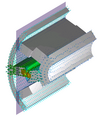 |
A cut plane through the model is introduced. |
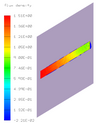 |
The flux through the tooth - by integration over the tooth cut plane the flux linkage can be determined.
All these steps can be performed with the post processing capabilities of iMOOSE.trinity. |
|
Spherical Motor |
 |
Quite large model of an experimental spherical motor with permanent magnets (green and red).
Coil windings and air regions are not shown. |
 |
Flux density distribution arising only from the permanent magnets. |
|
Claw-pole Alternator |
|---|
 |
High quality picture of a claw-pole alternator with translucent air regions. |
 |
Same as above but also the surface mesh is shown. |
 |
Flux density on the stator |
 |
Partitioned FE mesh for parallel computation on six cluster nodes with iMOOSE.stat3dpar.
Download movie here (4.6MB) |
|
Induction Heating |
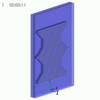 |
Large movie to illustrate the model of a transversal induction heating device for thin strips.
While the largest part of the model is needed to solve the electromagnetic problem, an thermal problem
must be solved on the strip even it is part of the electromagnetic mesh. For efficiency reason in case of parallel
computation different partition schemes must be applied on the thermal and electromagnetic problems.
Download movie here (6.6MB, duration 45 s) |

